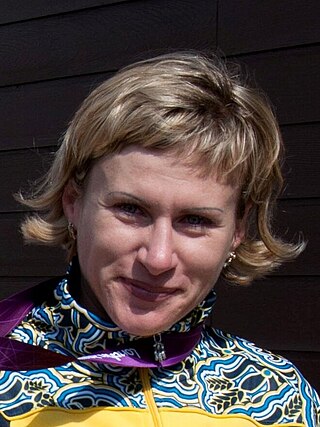Erzsébet Viski is a Hungarian sprint canoer who competed from 1998 to 2005. Competing in two Summer Olympics, she won two silver medals in the K-4 500 m event.
Andrey Borzukov is a Ukrainian sprint canoeist who competed from the mid-1990s to the mid-2000s (decade). He won two medals in the K-4 200 m event at the ICF Canoe Sprint World Championships with a gold in 2003 and a bronze in 1994.
The ICF Canoe Sprint World Championships are an international event in canoe racing, one of two top-tier Summer Olympic sport events organized by the International Canoe Federation. They are usually held every non-Olympic year and have officially included paracanoe events since 2010; paracanoe-specific editions of this event are usually held in Summer Paralympic years.
Ognjen Filipović is a Serbian sprint canoer who competed for Serbia and Montenegro and later Serbia. He won six medals at the ICF Canoe Sprint World Championships with two golds, a silver K-4 200 m: 2007 for Serbia), and three bronzes.
Anett Schuck is a German sprint canoer and marathon canoeist who competed from the early 1990s to the early 2000s (decade). Competing in two Summer Olympics, she won two gold medals in the K-4 500 m event, earning them in 1996 and 2000.

Inna Volodymyrivna Osypenko-Radomska is a Ukrainian-Azerbaijani sprint kayaker. Competing for Ukraine, she won four Olympic medals, including gold at the 2008 Olympics in K-1 500 m. She switched to Azerbaijan in 2014 and won a bronze medal at the 2016 Olympics.
Sergey Kirsanov is a Soviet and Ukrainian sprint canoeist who competed in the late 1980s and early 1990s. Competing in two Summer Olympics, he won a silver medal in the K-4 1000 m event at Seoul in 1988.
Nikolay Baranov was a Soviet sprint canoeist who competed in the early 1980s. He won four medals at the ICF Canoe Sprint World Championships with three golds and a silver.
Róbert Hegedüs is a Hungarian sprint canoeist who competed from the mid-1990s to early 2000s. He won ten medals at the ICF Canoe Sprint World Championships with seven golds, a silver, and two bronzes.
Oleksiy Slivinsky is a Ukrainian sprint canoeist who competed from the late 1990s to the mid-2000s (decade). He won six medals at the ICF Canoe Sprint World Championships with a gold, three silvers, and two bronzes.
Mykhaylo Luchnik is a Ukrainian sprint canoer who competed in the late 1990s and early 2000s. He won three medals at the ICF Canoe Sprint World Championships with a gold and two bronzes.
Andrey Petrov is a Ukrainian sprint canoer who competed in the mid-1990s. He won a bronze medal in the K-4 200 m event at the 1994 ICF Canoe Sprint World Championships in Mexico City.
Yuriy Kichayev is a Ukrainian sprint canoer who competed in the mid-1990s. He won a bronze medal in the K-4 200 m event at the 1994 ICF Canoe Sprint World Championships in Mexico City.
Boris Markin is a Ukrainian sprint canoer who competed in the early 2000s. He won a bronze medal in the K-4 200 m event at the 2001 ICF Canoe Sprint World Championships in Poznań. Borys was born in 1979 and now he lives in the United States.
Daniela Gleue is a German sprint canoer who competed in the mid-1990s. She won five medals at the ICF Canoe Sprint World Championships with two golds, two silvers, and a bronze.

Judith Hörmann is a German sprint canoer who has competed since 2005. She won seven medals at the ICF Canoe Sprint World Championships with three golds, two silvers, and two bronzes.
Maren Knebel is a German sprint canoer who has competed since the mid-2000s. She won three medals at the ICF Canoe Sprint World Championships with two golds and a bronze.
Eva Laky is a Hungarian sprint canoer who competed in the mid to late 1990s. She won three medals at the ICF Canoe Sprint World Championships with two golds and a bronze.
Melinda Patyi is a Hungarian sprint canoer who has competed since the early 2000s. She won three medals at the ICF Canoe Sprint World Championships with a two golds and a silver.
Dorota Kuczkowska is a Polish sprint canoer who has competed since the early 2000s. She won three medals at the ICF Canoe Sprint World Championships with a silver and two bronzes.

